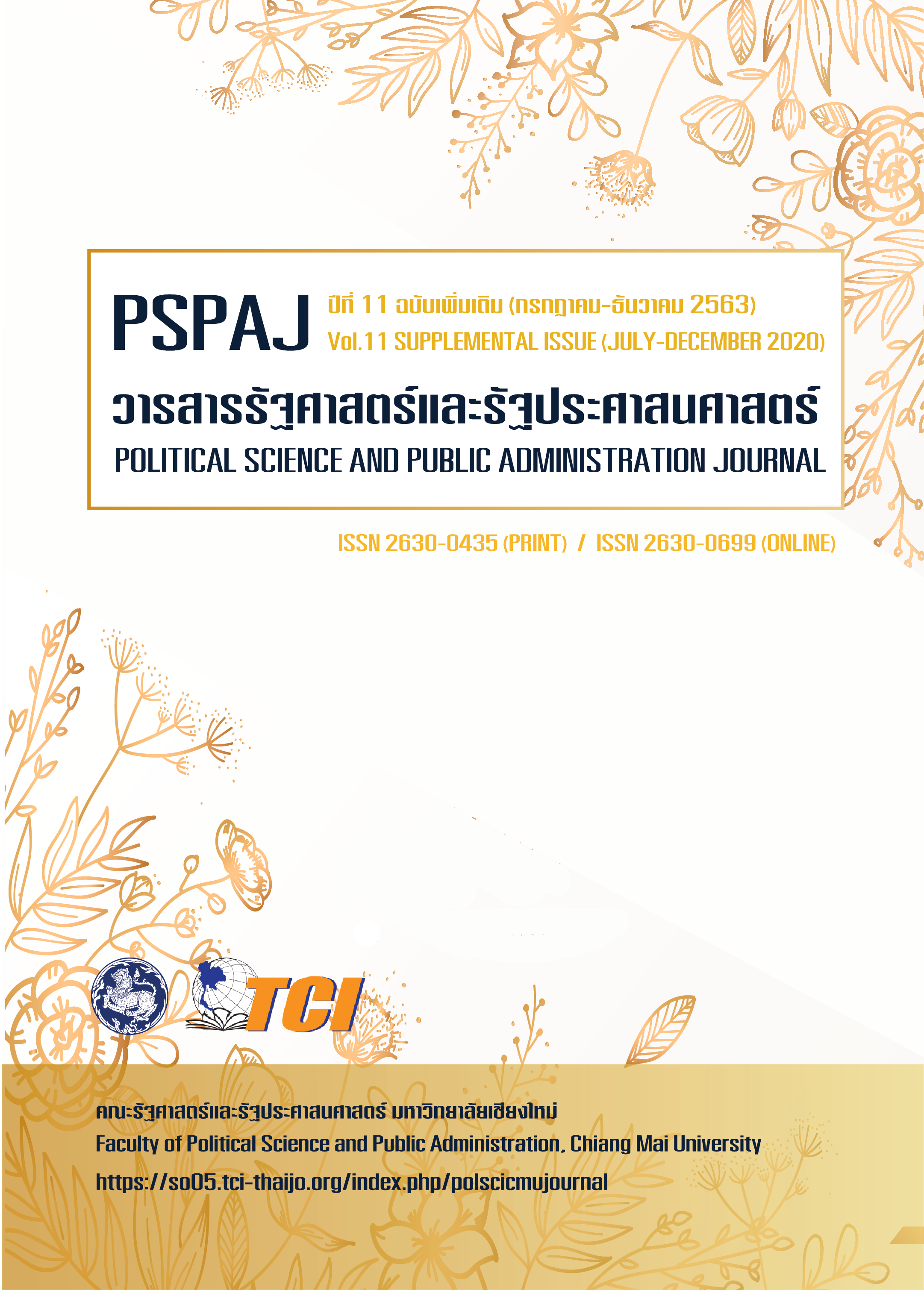Public Participation in Decentralization Policy Making: A Comparative Study of Thailand and UK
Main Article Content
Abstract
This research aims to examine public participations in decentralized policy making in UK and Thailand, and compare determinants and contexts of the participation in these two countries. It is based on decentralization theories, Arnstein’s participation approach, and Kingdon’s multiple-stream policy approach. This study employs qualitative methodology which consists of documentary research as data collection method and content analysis as data analysis method. Evidently, the research found that public participations in decentralization policy making in UK and Thailand have one thing in common, which is policy advocacy by elites. Generally, this is a game of pulling and hauling between central and local elites. On the other hand, the two countries differ in two matters. One is that the participation in UK appears in more forms than those appear in Thailand. Another is that, regarding different contexts between the two cases, decentralization in UK have evolved into independence issue while Thailand remains in decentralization-to-recentralization cycle.
Downloads
Article Details
- เนื้อหาและข้อมูลที่ลงตีพิมพ์ในวารสารรัฐศาสตร์และรัฐประศาสนศาสตร์ถือเป็นข้อคิดเห็นและความรับผิดชอบของผู้เขียนบทความโดยตรง ซึ่งกองบรรณาธิการวารสารรัฐศาสตร์และรัฐประศาสนศาสตร์ ไม่จำเป็นต้องเห็นด้วย หรือร่วมรับผิดชอบใดๆ
- บทความและข้อมูล ที่ได้รับการตีพิมพ์ในวารสารรัฐศาสตร์และรัฐประศาสนศาสตร์ ถือเป็นลิขสิทธิ์ของวารสาร หากบุคคลหรือหน่วยงานใดต้องการนำข้อมูลไปใช้ประโยชน์ในทางวิชาการ ขอให้อ้างอิงแหล่งที่มาด้วย
References
โกวิทย์ พวงงาม. (2550). การปกครองท้องถิ่นไทย: หลักการและมิติใหม่ในอนาคต. กรุงเทพฯ: วิญญูชน.
ดารารัตน์ คำเป็ง. (2559). รายงานการวิจัยฉบับสมบูรณ์ เรื่อง "ระดับการมีส่วนร่วมทางการเมืองของชุมชนโดยรอบมหาวิทยาลัยพะเยา". พะเยา: มหาวิทยาลัยพะเยา.
ถวิลวดี บุรีกุล. (2552). พลวัตการมีส่วนร่วมของประชาชน: จากอดีต จนถึงรัฐธรรมนูญแห่งราชอาณาจักรไทย พุทธศักราช 2550. กรุงเทพฯ: สถาบันพระปกเกล้า.
ธเนศวร์ เจริญเมือง. (2545). 100 ปี การปกครองท้องถิ่นไทย พ.ศ. 2440-2540. กรุงเทพฯ: โครงการจัดพิมพ์คบไฟ.
ประสงค์ชัย เศรษฐสุรวิชญ์. (2558). การศึกษาการเข้าสู่วาระนโยบาย: วิเคราะห์ตัวแบบพหุกระแสและการนำไปใช้. วารสารการเมือง การบริหาร และกฎหมาย, 7(3), 301-331.
ปรัชญา เวสารัชช์. (2542). การปกครองท้องถิ่นของประเทศญี่ปุ่น. กรุงเทพฯ: โครงการส่งเสริมการบริหารจัดการที่ดีโดยกระจายอำนาจสู่ท้องถิ่น.
______. (2543). การปกครองท้องถิ่นของประเทศอังกฤษ. กรุงเทพฯ: โครงการส่งเสริมการบริหารจัดการที่ดีโดยกระจายอำนาจสู่ท้องถิ่น.
ปิยากร หวังมหาพร. (2546). นโยบายผู้สูงอายุของประเทศไทย. (วิทยานิพนธ์รัฐศาสตรดุษฎีบัณฑิต), จุฬาลงกรณ์มหาวิทยาลัย.
วัลลภา รุ่งศิริแสงรัตน์. (2545). บรรพบุรุษไทย: สมัยก่อนสุโขทัยและสมัยสุโขทัย. เชียงใหม่: สถานวิชาการนานาชาติ มหาวิทยาลัยเชียงใหม่.
วีระศักดิ์ เครือเทพ. (2558). 15 ปีการกระจายอำนาจของไทย. กรุงเทพฯ: โรงพิมพ์แห่งจุฬาลงกรณ์มาหวิทยาลัย.
ศุภชัย ยาวะประภาษ, และปิยากร หวังมหาพร. (2555). นโยบายสาธารณะระดับท้องถิ่นไทย. กรุงเทพฯ: สำนักพิมพฺ์จุฬาลงกรณ์มหาวิทยาลัย.
ศุภสวัสดิ์ ชัชวาลย์. (2555). การเมืองในกระบวนการกระจายอำนาจ: ศึกษาผ่านบทบาทของนักวิชาการ ข้าราชการ นักการเมือง และประชาชน. กรุงเทพฯ: จุฬาลงกรณ์มหาวิทยาลัย.
Arnstein, S. R. (1969). A Ladder of Citizen Participation. Journal of the American Institute of planners, 35(4), 216-224.
Béland, D. (2005). Ideas and Social Policy: An Institutionalist Perspective. Social Policy & Administration, 39(1), 1-18.
Bochel, H., Mitchell, J., Denver, D., & Pattie, C. (2000). Scotland Decides: The Devolution Issue and the 1997 Referendum. Oxon: Routledge.
Bond, R., & Rosie, M. (2002). National Identities in Post-devolution Scotland. Scottish Affairs, 40(1), 34-53.
Bonney, N. (2002). Scottish Devolution: What Lies Beneath? The Political Quarterly, 73(2), 135-143. doi: 10.1111/1467-923X.00451
Bradbury, J., & Mitchell, J. (2005). Devolution: Between Governance and Territorial Politics. Parliamentary Affairs, 58(2), 287-302. doi: 10.1093/pa/gsi023
Bromley, C. (2003). Devolution: Scottish Answers to Scottish Questions?: the third Scottish Social Attitudes Report. Edinburgh: Edinburgh University Press.
Finlay, R. J. (1994). Scotland in the Twentieth Century: In Defence of Oligarchy? Scottish Historical Review, 73(1), 103-112.
Howlett, M. (1998). Predictable and Unpredictable Policy Windows: Institutional and Exogenous Correlates of Canadian Federal Agenda-setting. Canadian Journal of Political Science/Revue Canadienne De Science Politique, 31(3), 495-524.
Howlett, M., & Ramesh, M. (1995). Studying Public Policy: Policy Cycles and Policy Subsystems. Toronto: London: Oxford University Press.
Jeffery, C., & Mitchell, J. (2009). The Scottish Parliament 1999-2009: The First Decade. Edinburgh: Luath Press.
Keating, M. J. (2010). The government of Scotland: Public Policy Making After Devolution. Edinburgh: Edinburgh University Press.
Kingdon, J. W., & Thurber, J. A. (1984). Agendas, Alternatives, and Public Policies. Boston, MA: Little Brown.
Lynch, P. (2001). Scottish Government and Politics: An Introduction. Edinburgh: Edinburgh University Press.
Mitchell, J. (1996). Scotland in the Union, 1945-95: The Changing Nature of the Union State. In Devine T. M., & Finlay, R. J. Scotland in the Twentieth Century (pp. 85-101). Edinburgh: Edinburgh University Press.
Parry, R. (1988). Scottish political facts. Edinburgh: T. & T. Clark.
Stone, D. A. (1989). Causal Stories and the Formation of Policy Agendas. Political Science Quarterly, 104(2), 281-300.
Zahariadis, N., & Herweg, N. (2017). The Multiple Streams Approach. In The Routledge Handbook of European Public Policy (pp. 54-63). Oxon: Routledge.


